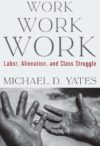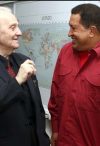
Measures to Defend Life on Planet Earth and Improve Living Conditions
Out of the dissatisfaction with the 2021 UN Climate Change Conference in Glasgow, Brazilian popular movements came together to propose measures to defend life on Earth. | more…

Out of the dissatisfaction with the 2021 UN Climate Change Conference in Glasgow, Brazilian popular movements came together to propose measures to defend life on Earth. | more…

The South African climate justice movement presents a model for popular revolt against the ecofascist project. | more…

As the effects of the climate crisis become ever-more deeply felt worldwide, our vision of the future must be grounded in radical imaginaries of the world to come, based on the experiences of those who suffer most under the current system of exploitation and violence. | more…

For most economists, labor is simply a commodity, bought and sold in markets like any other – and what happens after that is not their concern. Individual prospective workers offer their services to individual employers, each acting solely out of self-interest and facing each other as equals. The forces of demand and supply operate so that there is neither a shortage nor a surplus of labor, and, in theory, workers and bosses achieve their respective ends. Michael D. Yates, in Work Work Work: Labor, Alienation, and Class Struggle, offers a vastly different take on the nature of the labor market. | more…

Through this dramatic history by Stefan Heym, we become intimate with the story of the maverick and internationalist Karl Radek, known as the editor of the newspaper of record throughout the Soviet era, Isvestia. Beginning as Lenin’s companion at the dawning of the October Revolution, Radek later became Stalin’s favorite intellectual – only to find himself entangled in the great purges of the late 1930s and scripting his own trial. In this, his last historical novel, Heym reveals Radek as a brilliant Bolshevik journalist and politician who found himself at every turn of the wheel of fate. | more…
Capitalism’s two main underpinnings are control and exploitation/expropriation. While there are many sites of control they are all generally supportive of the interests of capital, namely, the endless drive to accumulate wealth. They all help to ensure that we behave so that the system continues to reproduce itself. Since workplaces are the sites where profits are extracted from our labor, it is here that control is most critical. | more…

What made István Mészáros’s life so fascinating, and relevant to issues of socialist construction, was that, having seen both sides of the Cold War, he came to perceive both “real socialism” and twentieth-century capitalism as two variants of the same system. He called this the capital system. The basic commonality among most countries of both the East and the West in the twentieth century was the extraction of surplus labor from workers who did not control their own work processes. | more…

István Mészáros was a global thinker strongly committed to anti-imperialist struggles. In this respect, he allied himself with those fighting for socialist transformation in the Philippines, Nicaragua, Venezuela, Brazil, and elsewhere. He argued that in the descending phase of capitalism there was a “downward equalization of the rate of exploitation,” by which he meant a race to the bottom in wages and working conditions, enforced by a global system of monopolistic competition. | more…

Increasing numbers of left-wing activists around the world are turning to Vincent Bevins’s The Jakarta Method to learn more about the horrific atrocities committed by the United States against peoples’ struggles for the right to self-determination in the so-called postcolonial era. In particular, the book describes how imperialist expansion destroyed revolutionary struggles in the third world. | more…

In 1975, Walter Rodney said, Africa is on the move. This line stays with me, digs deep into my sense of historical possibility. What did Rodney mean when he said that line? | more…

The rapid financialization of nature is promoting a Great Expropriation of the global commons and the dispossession of humanity on an unprecedented scale. | more…

The cold-blooded murders of activists by state forces in India represents a historical pattern of extrajudicial repression. | more…
Notifications